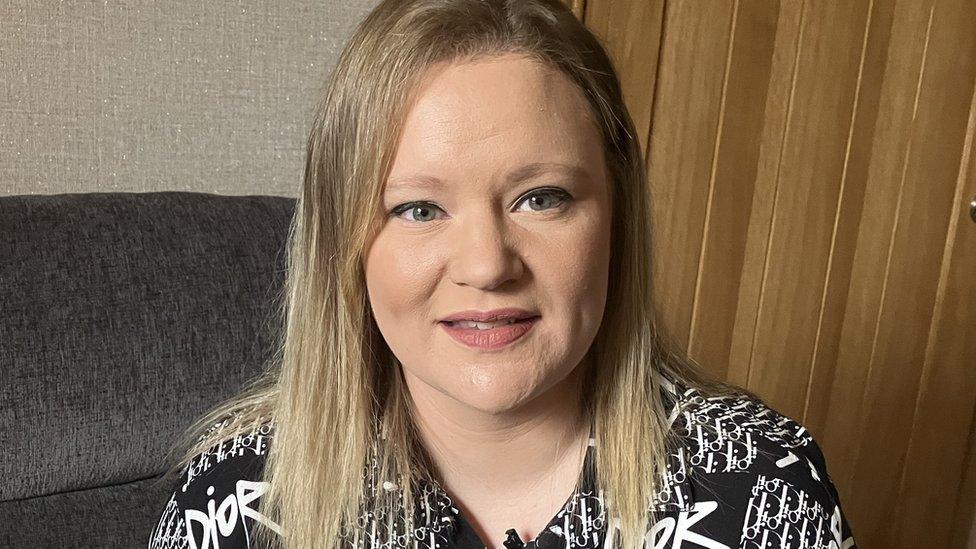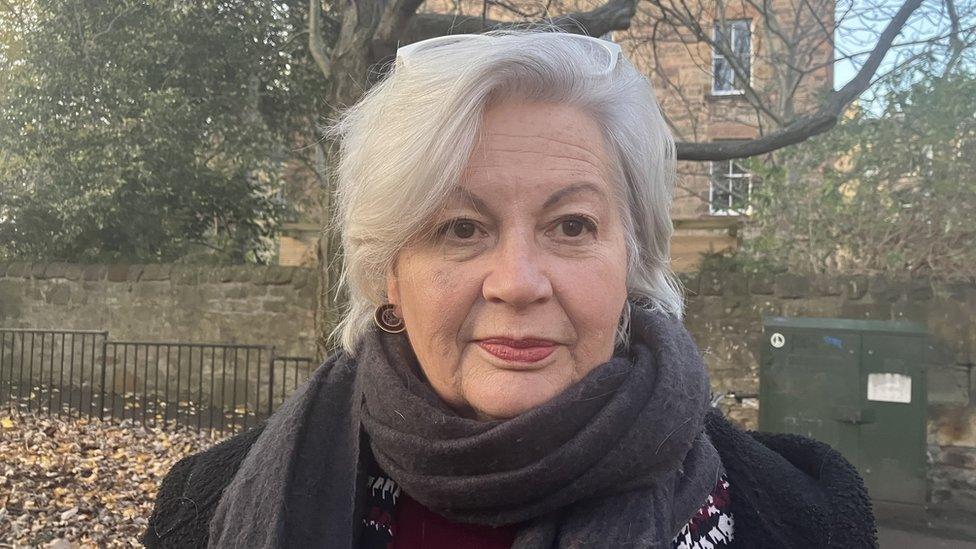My abusive partner took all my money but I escaped
- Published

Emma Artis left her partner after years of physical, verbal and financial abuse
It was after Emma Artis's partner attacked her with a knife that she found the strength to leave him for good.
After experiencing years of physical, verbal and financial abuse, Emma was facing bankruptcy.
Her partner had given up work completely and Emma had accumulated debt to "maintain the quality of life that he had come to expect".
"I had become the sole provider, which meant I was financially responsible for everything, including keeping the house and providing for three children," she told BBC Scotland.
"If I didn't have the money that he was asking for, I was at risk."
Emma left her partner two and a half years ago and he has since been convicted of domestic violence offences.
But thousands of people across Scotland are still in abusive relationships - and domestic abuse charities are warning that the cost of living crisis is forcing them into "life or death" decisions.
Scottish Women's Aid say that soaring food and energy costs, coupled with "inadequate" social security, are providing tools for abusers to "further entrap women".
Risk factor
Recent research from Women's Aid in England found that 73% of women in abusive relationships said that the cost of living crisis had either prevented them from leaving or made it harder.
Emma said: "I can 100% guarantee that women who are in the situation I was in, if there's not enough money to sustain their partner's needs and expectations, the abuse is gonna be much more of a risk factor.
"Other women will be in a situation where they don't have any money at all, and their abuser is filtering what they have."
She added: "A couple years ago there might have been more charity funding, there might have been more government funding to get them on their feet. Now, is that help there?"
The Scottish government is being urged by campaigners to "keep its promises" to people experiencing abuse.

Dr Marsha Scott said the cost of living crisis is adding to the concerns of abused women
"The biggest one is to make real the ability for women and children to stay in their homes, and to have the abuser rehoused or evicted if his name is on the tenancy," said Dr Marsha Scott, chief executive of Scottish Women's Aid.
Legislation was passed in 2021 which would allow the courts and social landlords to do this but these measures have not yet been implemented. Dr Scott said this was despite the best efforts of many of the agencies involved.
"When the cost of living crisis is added to the very constrained choices a woman being abused has already, it means that her calculations of risk about whether to stay or whether to go are really complicated by the fact that she's facing destitution sometimes," Dr Scott said.
"The Scottish government also promised to establish a leaving fund," she added.
"This would be a fund that would provide some emergency cash if women needed it, and also bridging money from the time that you're first eligible for universal credit to the time you actually get money."
The Scottish government accepted a recommendation to explore options for this fund in December 2020 but this has yet to be put into action.
"Leaving is the most dangerous time, and the majority of domestic abuse-related killings happen within a relatively short period of time of either women saying that they're going to leave, or actually leaving," said Dr Scott.
"We know they're really busy because of Ukraine, because of Covid, but what's more important than saving the lives of women and children experiencing domestic abuse?"
Dr Scott urged anyone experiencing abuse to seek help, including to one of Scottish Women's Aid's 34 local support centres.
They provide a variety of services, ranging from crisis services, recovery support, legal advice and safe houses.
Emma did exactly that, and although she had to take out a loan to avoid bankruptcy, she says she is doing "absolutely amazing" now and working as a primary school teacher.
"I'm two and a half years out of the relationship, I've got a second degree, I've got three happy children," she said.
"When you're in that relationship, you're making decisions to survive.
"Once you get to a point where you feel you can make that decision to leave and still have your life intact, you leave. Money is not the most important thing."
She added: "I think every woman doesn't want to have that representation of being weak or victimised or needed saved as such.
"Anybody who's reached out for help, they've saved themselves."
A Scottish government spokesperson said: "We're very concerned about the additional hardship women and children experiencing domestic abuse are facing as a result of the cost of living crisis."
They say they "recognise this can impact their ability to leave the abuser", and are "exploring the delivery of the financial support women may need when leaving an abusive partner".
They added: "This is why we're working with Scottish Women's Aid and other organisations to discuss how this support can be best developed and delivered.
"We're also giving social landlords greater control to transfer housing tenancies to a domestic abuse survivor, to help them avoid homelessness."